A healthy, well-grown Orange tree will be more resistant to pests and diseases and give more fruits. Orange trees have specific nitrogen, phosphorus, potassium, and calcium requirements. Some micronutrients are also essential (iron, boron, magnesium, aluminum, manganese, zinc, and copper). Nitrogen deficiency gradually reduces vegetation and causes the tree leaves to turn yellow, premature defoliation, and decrease production. Let’s check out the best fertilizer for Orange trees.
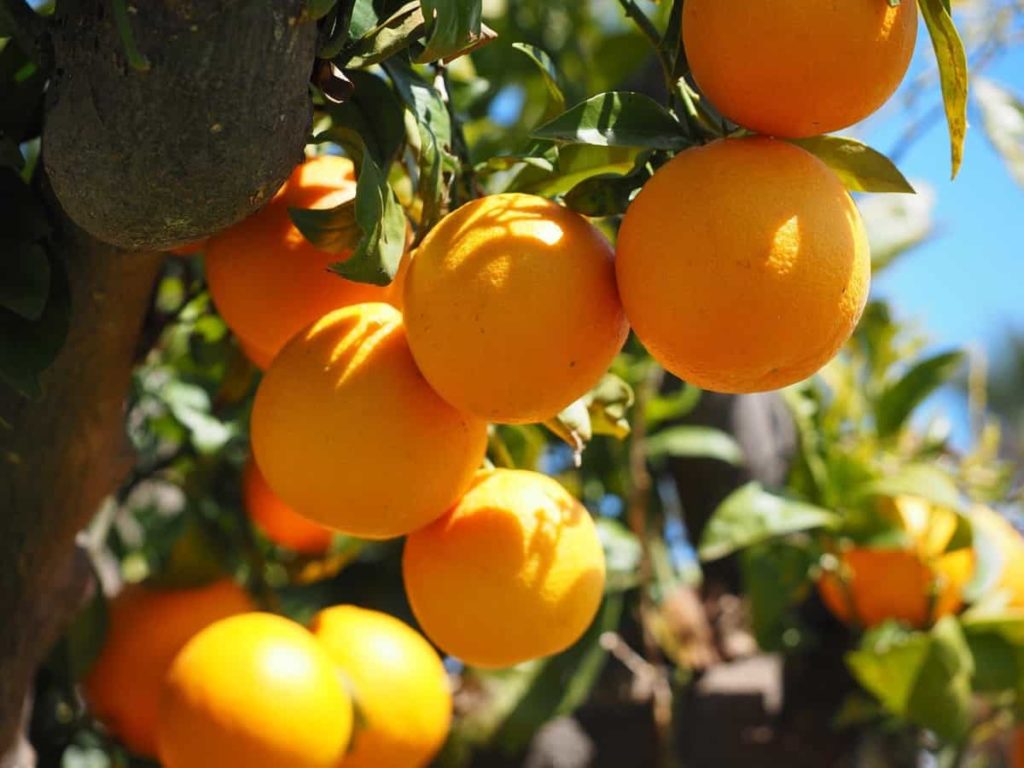
Nitrogen is the crucial nutrient needed for plant growth; its primary responsibility is to control vegetative growth within the plant. Phosphorus is essential for flower and root development. Potassium works indirectly than the other two nutrients. It activates the enzymatic reactions that occur inside the plant, making it necessary for the overall health of plants. Foliar fertilization is a fast-track method when iron, magnesium, boron, and copper deficiency have to be overcome during the critical stages of crop growth.
You should also test soil pH at least once a year. Yellow leaves on an Orange tree indicate malnutrition. Yellow leaves also show dehydration, but inappropriate fertilization is the possible cause if your tree gets water regularly. Apply fertilizers throughout the rooting area of your Orange tree, about twice the diameter of the tree’s canopy. Never apply fertilizer directly against the tree’s stem. Fertilize your Orange tree thrice a year for excellent health and fruit production. Breaking the application into three parts is part of nutrients washed away by the soil during rains.
Best fertilizer for Orange trees
Organic fertilizers for Orange trees
- Coffee grounds replace the nutrients available in soil with Orange trees planted, including phosphorus, magnesium, nitrogen, copper, and potassium.
- Magnesium can help the tree produce large fruits and result in thinner peels on Oranges. Correcting magnesium deficiency should grow new leaves with healthy leaves with dark green color. You can feed the trees with Epsom salt, two tablespoons of Epsom salt per 9 square feet. Do not sprinkle the Epsom salt directly against the base of the tree. Leave the material until the rain naturally washes it off in the soil or water it. Water indoor Orange trees with two tablespoons of Epsom salt mixture in 1 gallon of water per month.
- Bone meal is the better source of phosphorus, but it also contains nitrogen and calcium, which require Orange and other citrus plants to thrive. Usually, the bone meal contains 5% nitrogen, 12% phosphorus, and 22% calcium content.
- Composted manure replaces chemical and liquid fertilizers if you prefer a natural, organic approach to fertilize your Orange tree. But it is essential to be careful when applying, as composted manure salinity is high, which can burn your tree root system. For fertilizing Orange trees, do not use chicken manure, as it has the highest salt content. Mix composted manure in the top 1 inch of soil around your tree root system to avoid burning your tree. Winter rains help wash extra salt from the soil.
- Outside the area near the stem and large roots, citrus trees benefit from round layers of mulch to maintain moisture, stop weeds, feed the soil, moderate soil temperatures and protect shallow feeder roots. Young and established trees can be mulched with a 1-to-2.5-inch layer of thick mulch like wood chips, leaves, straw, or pine needles.
In case you missed it: Orange Gardening For Beginners, How To Start, FAQs
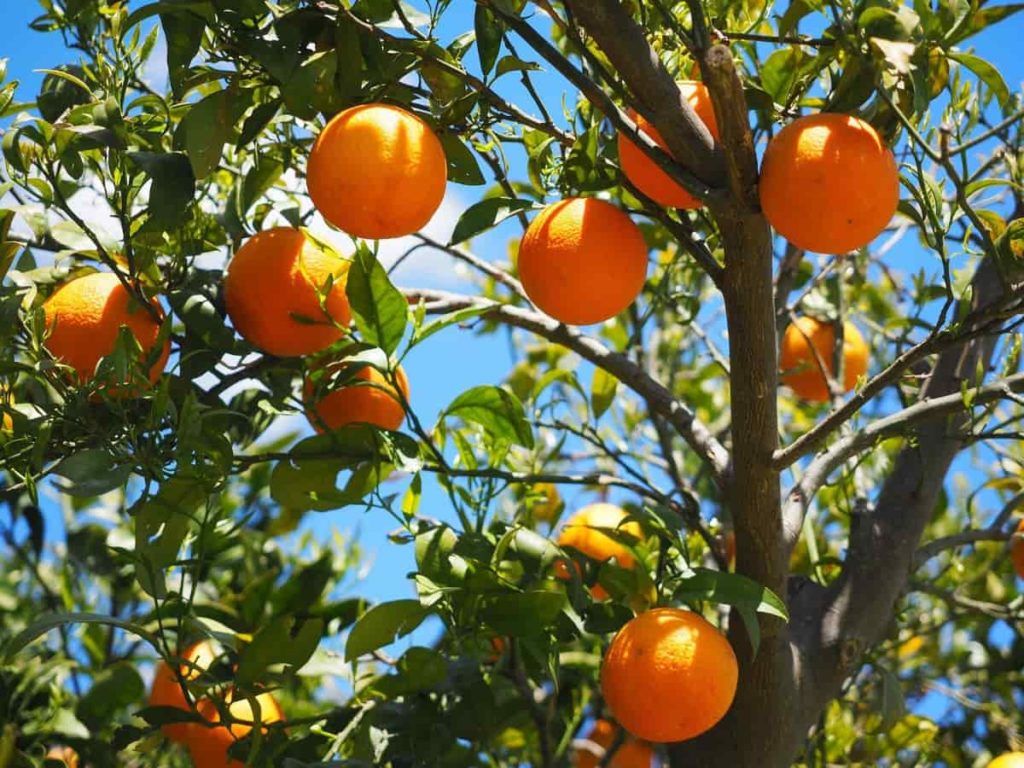
Commercial fertilizers for Orange trees
NPK ratio
A complete fertilizer provides all the essential macronutrients and micronutrients the Orange tree needs for the best health. Citrus trees consume large amounts of iron, zinc, and manganese, and you should compliment them for the best fruit production. A complete fertilizer like 8-8-8 or 10-10-10, slow-release liquid fertilizer solution includes the necessary nutrients and micronutrients needed for your tree to thrive in a simple to-apply solution. Apply complete fertilizer three times a year on top of 1 inch of soil around your tree root system.
Orange trees fertilizer schedule
How much fertilizer is needed for Orange trees can depend on the soil, climate, and other factors. Usually, you should fertilize before any new buds sprout and when citrus plants start to become inactive for winter. It is considered an excellent time for applying NPK pellets as they will provide nutrients during citrus fruit growing seasons. Fertilize every six weeks during the first year, from February to September, ensuring a healthy plant. You should apply 1/2 cup of fertilizer three weeks after planting small trees.
Apply a balanced 8-8-8 fertilizer on the soil 3 feet around the tree to promote root growth. Fertilizer is not recommended to come in contact with the tree. Phosphate fertilizer is essential for newly planted Orange trees. It will need less after the tree is established. Newly planted trees need 1 3/4 cup phosphate fertilizer mixed with soil. Orange trees need only 450 grams of phosphorus every three to four years. Mix a liquid phosphate fertilizer in the top 1 inch of soil around the root system to ensure that the tree carries this nutrient through its roots instead of spraying it on Orange tree leaves.
A mature Orange tree needs 450 to 680 grams of nitrogen every year. Therefore, apply nitrogen fertilizer at 450 grams per annum of tree age. Apply slowly released nitrogen fertilizer solution, such as ammonium nitrate, ammonium sulfate, or urea, thrice a year. Once in early spring, early summer, and early fall. Nitrogen fertilizer alone does not balance the nutritional needs of your Orange tree. After nitrogen fertilization, use citrus food or micronutrient spray in place of essential nutrients like magnesium, copper, manganese, zinc, and boron.
In case you missed it: Growing Orange in Pots from Seed – A Full Guide
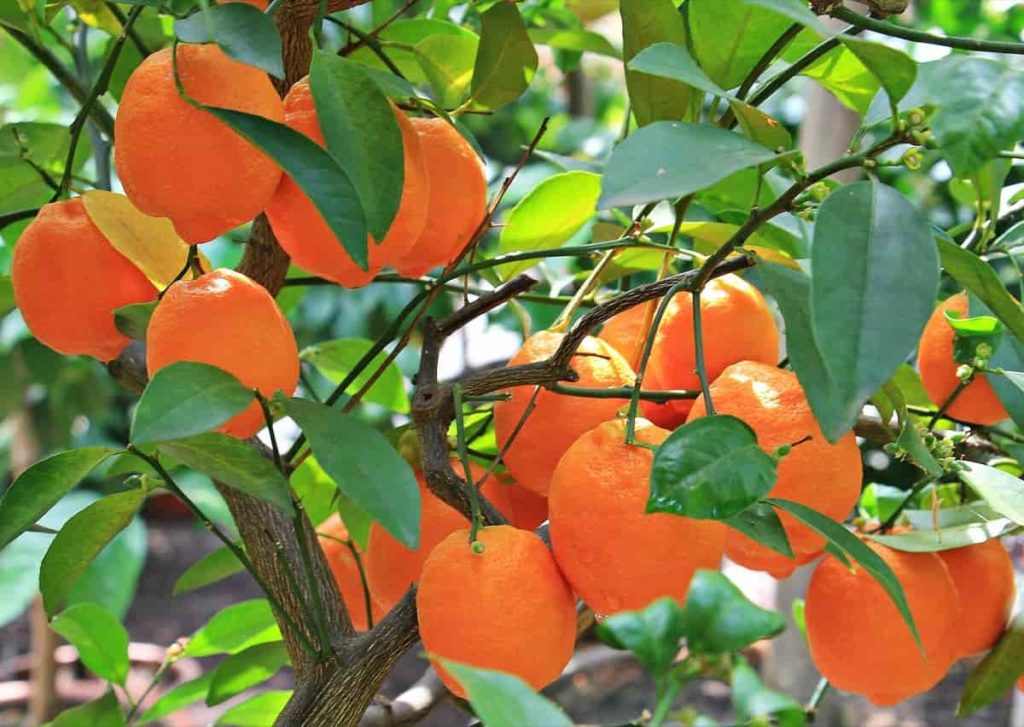
You should provide micronutrients to suit their needs for healthy plants’ general growth and development. Even a lack of a micronutrient will result in a negative impact on plant growth and fruit quality. You can provide micronutrients either through soil or in the form of liquid spray. When soil pH is either too low (below 5.5) or too much (more than 9.0), many micronutrients are not available for plants, though present in sufficient soil quantities.
Calcium – This is needed to develop extensive route systems, proper use of water, development of cell walls, and impart strength to the plant. In the presence of calcium overdose, the availability of phosphorus, Fe, Mn, zinc, copper, and boron decreases.
Magnesium – Magnesium deficiency will lead to a decrease in production. Magnesium deficiency occurs mainly in gardens planted on light sols. Symptoms of deficiency consist of yellow spots starting with the midribs of leaves, close to fruits. Due to high magnesium movement in younger and developing leaves, deficiency symptoms are prominently seen in older leaves. Magnesium spray application will correct its deficiency.
Sulfur – Sulfur helps in the manufacture and protein making of chlorophyll. Sulfur deficiency can be confused several times with symptoms of nitrogen deficiency. Even after using nitrogen, if the leaves continue to be yellow, it may be due to the lack of sulfur in the soil. Sulfur deficiency often leads to the drying of twigs from the top end to the bottom. The fruit rind gets thicker. You can overcome sulfur deficiency by applying sulfur-containing salts or fertilizers like ammonium sulfate, which contains more than nitrogen (20%) sulfur (26%).
Zinc – The zinc deficiency will result in prolonged plant growth and yellowing of leaves. Leaves become small, narrow, pointed, and chlorotic. These leaves fall quickly, drying the back of the twigs. You can overcome deficiency by spraying 0.25% zinc sulfate twice weekly.
Iron – Iron deficiency is a problem in alkaline soil. The clear sign of iron deficiency in Orange is a specific pattern of chlorosis in leaves, i.e., green veins against a light green or yellow background. Iron chelate soil application can overcome iron deficiency. The desired effects will require frequent foliar spray weekly with 1% ferrous sulfate.
In case you missed it: Best Fertilizer for Grapefruit Trees: Organic, NPK Ratio, How and When to Apply

Manganese – Special signs of manganese deficiency can be seen with green midribs and veins on the light green background of young leaves. Manganese deficiency occurs in both alkaline and acidic soils. A 0.2 percent manganese sulfate spray will correct the deficiency twice weekly.
Copper – Lack of copper will result in light green leaves with specific spots. The condition of zinc, iron, and manganese deficiency is almost the same for copper, especially in acidic and sandy soils. Plants infected with chlorosis can be exported using copper and zinc sulfate (0.5% spray). Copper-based fungicides will also address the copper deficiency in Orange plants.
How to fertilize Orange trees in pots
Potted Orange is a perfect citrus tree to grow in a pot on the balcony or roof. Maintaining citrus grown from this container helps promote the Orange crop from repotting to harvesting and prevents the appearance of diseases. You will fertilize your dwarf Orange tree with fertilizer made for citrus trees. It will have more nitrogen (often three times) than phosphorus or potassium. Fertilize as per the manufacturer’s instructions.
Usually, you will fertilize your dwarf Orange tree once or twice a month during its active growing season and less frequently during winter. 8-8-8 or 10-10-10, slow-release, liquid fertilizer will provide the plant with all the essential nutrients and micronutrients. The best time to fertilize Orange trees is during spring and summer. Fertilizing Oranges will also increase their size and weight during the fruit growing stage.
Frequently asked questions about fertilizers for Orange trees (FAQ)
How long does it take to fruit the Orange tree?
When acquiring an Orange tree, keep in mind that it can take three to five years to fruit it, depending on how old it is. When the tree finally starts producing fruit, it will take 7 to 8 months for the fruit to mature.
In case you missed it: Best Fertilizer for Mangosteen Tree: Organic, Compost, NPK, How and When to Apply
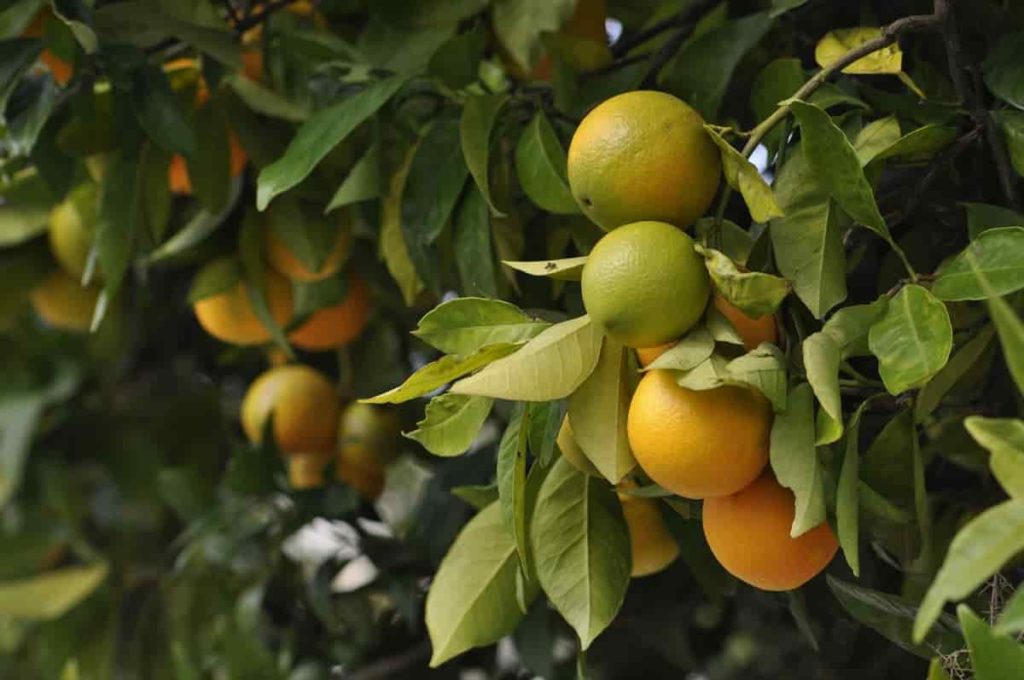
How do I get more Oranges on my tree?
Increase the nutrition of the Orange tree and modify the soil around its stem with a combination of fast-draining soil and organic manure. Add a dose of fruit fertilizer to the Orange tree soil in early spring to promote growth and blooming.
How do you grow sweet Orange?
Oranges need the right amount of nitrogen in the growing season to produce sweet fruits. Therefore, fertilizer should not be added until the tree starts growing. In addition, too much fertilizer can cause long growth and fruit deficiency.
How often should you water an Orange tree?
You should water Orange trees every few days during the first two weeks after planting. Once they are established, you should gradually reduce this water from 7 to 28 days in terms of year and soil type.
Why are my Oranges not juicy?
A common reason for dry Orange fruit is when Oranges are left too long on the tree after being fully ripened. If a tree gets too little water during fruit, it can produce dry Oranges.
In case you missed it: How to Grow Mangosteens from Seeds: At Home, In Pots, and Backyard
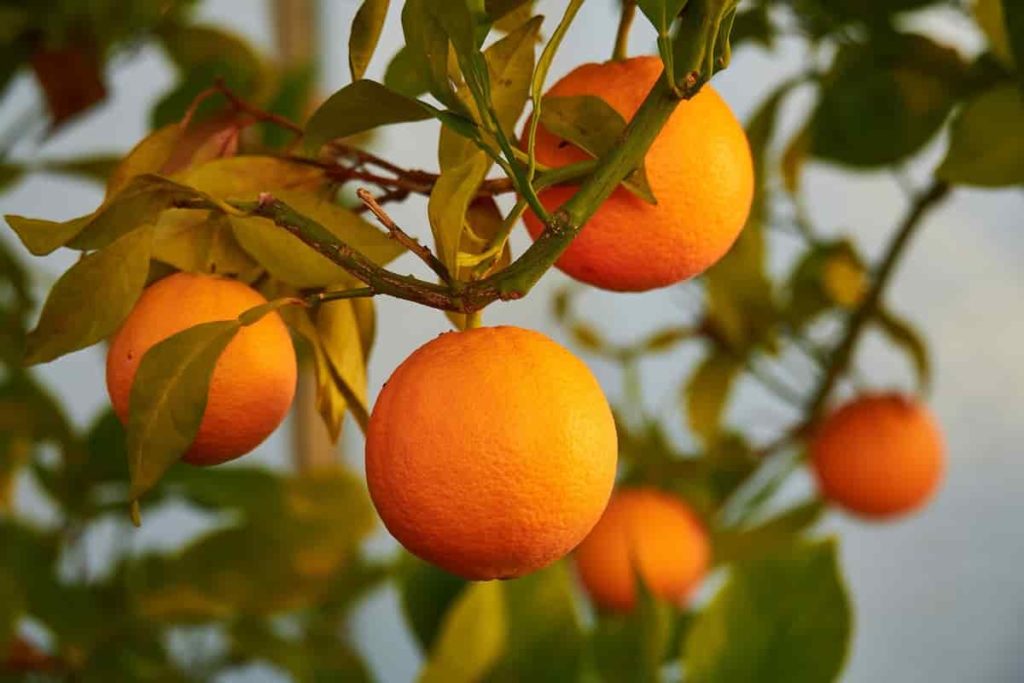
Why are my Orange tree leaves turning yellow?
Orange leaves turn yellow due to fungal diseases like excessive overwatering, iron deficiency, and root rot. Apply nitrogen fertilizer or urea to fix yellow leaves. If your soil is soggy, repot the tree to a fresh clay mix, then water it 1 to 2 times a week while letting the soil dry in the middle of the water.
- How to Grow Tomatoes Organically at Home: A Comprehensive Guide
- Organic Gardening on a Budget: Low-Cost Methods and Materials
- Gongura Seed Germination and Planting Methods
- Cabbage Seed Germination and Selection
- Broccoli Seed Germination and Selection
- Asparagus Seed Germination and Variety Selection
- Seasonal Flower Gardening: Best Practices for Spring, Summer, Fall, and Winter
- How to Grow Hibiscus from Flower
- Plantation Ideas for Home Decoration: A Beginners Guide
- Flower Garden Designs and Layouts for Beginners
- Planting and Spacing Techniques in Papaya: A Beginner’s Guide
- Growing Gold: Essential Techniques for Planting Pineapples
- How to Make Kalanchoe Plant Bushy: Home Remedies and Solutions
- 11 Reasons Why Your Gardenia is Not Blooming: Home Remedies and Solutions
- Eco Elegance: The Guide to Designing a Drought-Tolerant Landscape
- Gardening on a Slope: Strategies for Hillside Landscaping
- Nourish and Flourish: Top Organic Mulches for Thriving House Plants
- Everything You Want to Know about Indian Mogra Flower: Discover Uses and Growing
- Green Thumb Success: Expert Tips for Cultivating Greenhouse Pumpkins All Year Round
- Maximize Growth & Flavor: The Ultimate Guide to Companion Planting in Herb Gardens
- How to Control Rhododendron Problems Naturally: Home Remedies and Organic Ways to Fix Them
- Natural Magic: The Remarkable Benefits of Cinnamon for Plants
- Best Steps to Revive Dying Tulip with Natural and Organic Treatment
- 10 Reasons Why Your Angel Trumpet is Not Blooming: Remedies and Treatment
- How to Fix Periwinkle Leaf and Flower-Related Problems: Natural Remedies and Solutions
- How to Fix Zinnias Leaf and Flower Problems: Discover Natural and Home Remedies
- Organic Steps to Induce Lemon Tree Flowers: A Comprehensive Guide
- Bloom Booster: Crafting the Perfect Homemade Bougainvillea Fertilizer
- Optimizing Growth: A Guide to Applying NPK Fertilizer for Potted Plants
- 10 Best Homemade Fertilizers for Rubber Plant: DIY Recipes and Application Method
- How to Boost Female Pumpkin Flowers: Effective Steps for More Flowers and High Yields
- Transform Your Indoor Garden: Top Benefits of Pink Salt for Houseplants
- 10 Best Homemade Fertilizers for Peacock Plants (Calathea): Easy DIY Guide
- Unlock Blooms: 9 Reasons Why Your Potted Chrysanthemum is Not Blooming
- 8 Reasons Why Your Potted Hibiscus is Not Blooming: Fix it with Simple Solutions
- Unlock Blooms: 9 Key Reasons Your Potted Frangipani Won’t Flower
I have more than 200 trees of Orange trees. Planted them 4 years ago, and they have all fruited with good size and healthy oranges. However, my problem is this; The orange fruits when eaten have alot of water and not so sweet? Now i have read up that the solution may be to add the right potassium fertiliser to the said oranges. Kindly your response will be appreciated.
Many thanks.